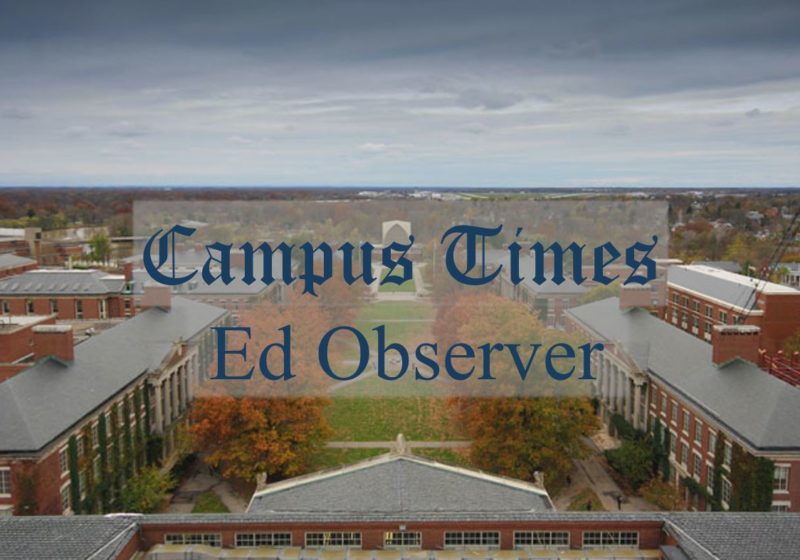This week I started reading Donna Tartt’s “The Secret History,” about a college student named Richard from a broken California home who arrives at a prestigious private university in Vermont. Much of the first few chapters include long, descriptive paragraphs where he walks around campus, “roaming like a sleepwalker, stunned and drunk with beauty.”
I keep turning back to page 11, specifically, where Tartt describes Richard’s fascination with the college before he even applies. Flipping through a brochure, he says, “Even now, I remember those pictures, like pictures in a storybook one loved as a child. Radiant meadows, mountains vaporous in the trembling distance; leaves ankle-deep on a gusty autumn road; bonfires and fog in the valleys; cellos, dark window panes, snow.”
In high school, I was lucky enough to attend an arts boarding school in Northern Michigan where I studied creative writing. Those were some of the most simultaneously exhilarating and damaging years of my life. For three years, I was steeped in a cutthroat culture that preached you couldn’t teach talent — either you had it, or you didn’t.
If you had it, you weren’t explicitly told that you needed to continue your education at an elite university, but the idea consumed us. The authors we read — white Americans from the ’70s, ’80s, ’90s — had all attended such schools. The films we watched in class — “Dead Poets Society” and “Good Will Hunting,” for example — promised a romanticized comfort from an institutional education.
I was determined to arrive in a collegiate setting and become the best student — and, by extension, the best version of myself — I could be.
As I quickly learned, however, this was much harder than it seemed. Many of my high school classmates went on to elite universities, while I was rejected by nearly all of the ones to which I applied. I didn’t know what I was doing.
In fact, I wasn’t even sure what I wanted. After the dust of senior spring settled, I was confused. Did I truly want to attend a college like that, or did I just absorb the doctrine? My understanding of intellectual success was that it was gatekept within the ivory towers of elite institutions. Did I even want to continue my education in such a system, or did I want something else entirely?
I ended up away from the Midwest — hello, New York state — which was part of my young, naive dream. But the rest of it has fallen away. Do I even want to become a successful writer? Do I crave the same intellectual prowess I so desperately wanted before? Even during my first and sophomore years at UR, after taking a gap year, I felt as equally dazed and confused as I felt after high school. As I reached junior year, I discovered that I really only wanted to do two things — to live a full, passionate life, and to make good art about it.
In 2012, author Neil Gaiman gave a commencement speech at University of the Arts in Philadelphia. He said, “Make your art. Do the stuff that only you can do. The urge, starting out, is to copy. And that’s not a bad thing. Most of us only find our voices after we’ve sounded like a lot of other people.”
It took an entire pandemic for me to realize this. Until then, I was reading the same literature I’d read in high school, written by and for white people, that had been commended by institutions of higher education for its literary strength. The art I consumed for pleasure was diversified, but not the texts I was assigned for classes, which took up most of my time. Not only was I emulating such style in my own work, but I was subconsciously following the same path I thought all writers had to follow in order to be successful.
The Western literary canon is deeply flawed. Each year, I was fed the exact same narrative over and over again, with few exceptions. During lockdown, I started reading more for pleasure again instead of for my studies. I journaled every day, recounting the experiences I’d lived through that made good art and great stories. None of them had anything to do with my experiences in the classroom.
At the end of my junior year of high school, I celebrated my friend’s graduation with her. She lived on a goat farm in Northern Michigan, and we discussed the future as we sat amongst the goats. As the sun set, she said to me, “I think in order to write well, we have to live well.”
I value these moments more than the times I’ve spent poring over literary texts for class.
Perhaps my future will be nothing like I imagined. Perhaps it will be nothing like my past. Perhaps it won’t be anything special at all. Regardless, I hope to stumble through the rest of my life like Richard, stunned and drunk on the sheer beauty of living, and I hope to find a kind of paradise by writing it well.




